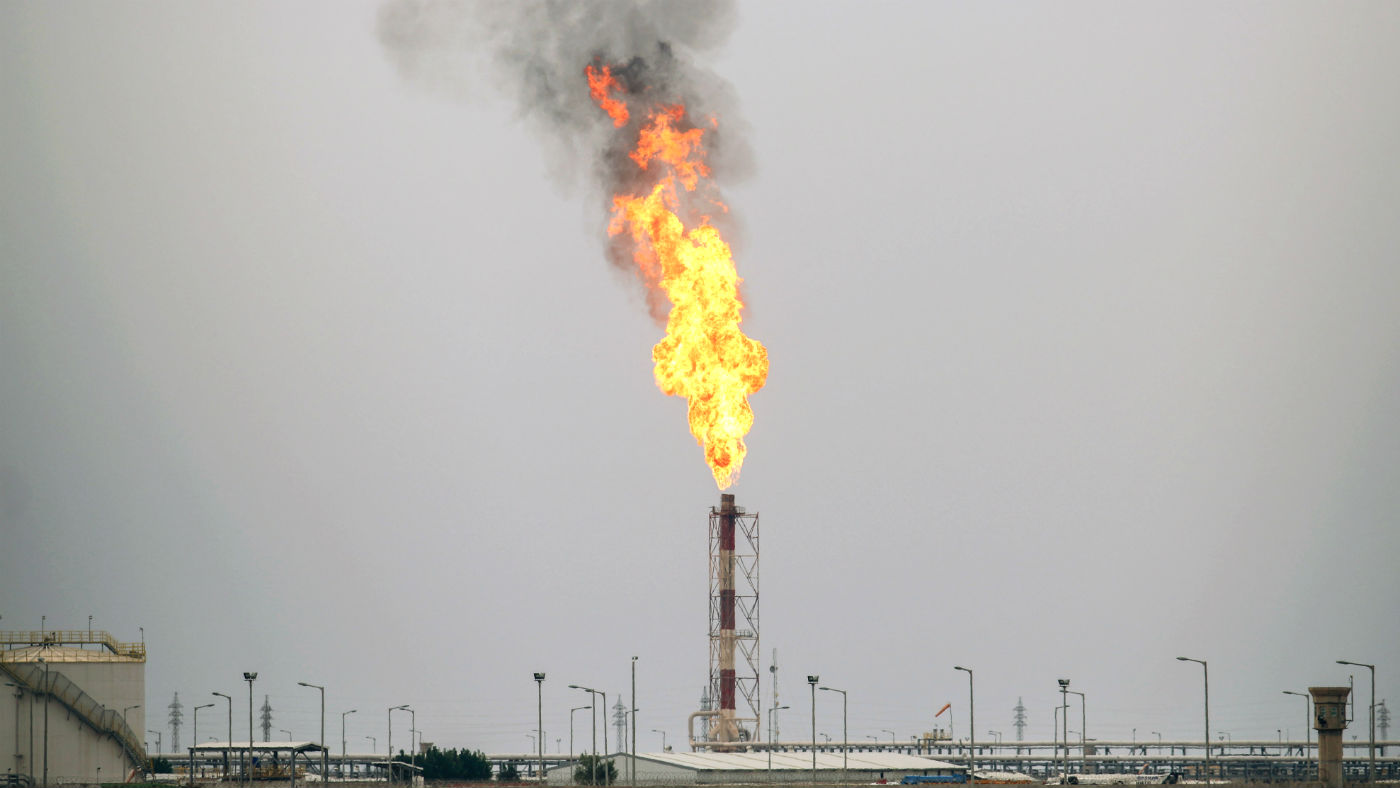Oil price posts two-year highs - but how long can it last?
Brent rose above $59 a barrel this week, its best third-quarter showing since 2004

A free daily email with the biggest news stories of the day – and the best features from TheWeek.com
You are now subscribed
Your newsletter sign-up was successful
Oil price hits five-month low as growth slows
05 May
The oil price fell to a five-month low this morning, as markets respond to news of a slowdown in both the US and Chinese economies.
International oil price benchmark Brent crude hit $47.88 a barrel at 7.16am in London, down 50 cents, or one per cent, on its previous closing price. In the US, West Texas Intermediate (WTI) was down 1.3 per cent or 60 cents, at $44.92 a barrel, its lowest price since 14 November, reports Reuters.
The Week
Escape your echo chamber. Get the facts behind the news, plus analysis from multiple perspectives.

Sign up for The Week's Free Newsletters
From our morning news briefing to a weekly Good News Newsletter, get the best of The Week delivered directly to your inbox.
From our morning news briefing to a weekly Good News Newsletter, get the best of The Week delivered directly to your inbox.
Meanwhile, Asia-Pacific stocks fell for the third consecutive day, says The Guardian, with investors spooked to see oil fall so low, suggesting the optimism of the first quarter is gone.
After a sustained rally which began when Opec, Russia and other oil-producing nations agreed to cut production last November, oil prices are now firmly back under the psychologically significant $50-a-barrel mark.
It is a far cry from June 2014, when prices reached a peak of $115 per barrel. A sustained global oversupply since then has seen oil prices plummet
The optimism initially provoked by news of the cuts has now deserted the markets, while their promised curb in production does not seem to have been deep enough.
A free daily email with the biggest news stories of the day – and the best features from TheWeek.com
Additionally, US output shows a steady upward trend, adding more oil to the oversupply.
Opec stepped in this morning to tell markets is likely to extend its current supply limits – but that was not enough to reassure investors, says spread-betting provider IG. Instead, traders "focused on the lack of further cuts possible".
James Woods of Rivkin Securities said: "Any likelihood of an increase in the level of cuts remains slim with OPEC officials playing down this possibility."
Over the year so far, both Brent and WTI are down around 17 per cent.
Shell latest to report boost from higher oil price
4 May
Royal Dutch Shell is the latest oil major to report rising profits thanks to this year's oil price recovery.
Profits hit $3.8bn (£2.9bn) for the first quarter on a "current cost of supply" basis, the company's preferred measure. That's more than double the $1.8bn (£1.4bn) for the same period last year.
"The top five oil supermajors - Shell, ExxonMobil, Chevron, Total and BP - have all beaten analysts' expectations with their quarterly results in the past week," says the Financial Times.
The reports reflect the recovery in the oil price compared to this time last year, a period during which it hit a 13-year low of $27 a barrel in February.
"Statoil of Norway and Repsol of Spain also announced forecast-beating first-quarter results on Thursday, reflecting the 60 per cent increase in crude prices over the past year to an average of $54.61 a barrel during the reporting period," adds the FT.
Oil prices are not pressing on, however, and that could be a problem to majors needing longer-term prices of $60 or more to meet cash flow needs.
Today, in fact, international oil price benchmark Brent crude fell below $50 a barrel for the first time since last November.
Its US counterpart West Texas Intermediate also fell, plunging 2.6 per cent to below $47 a barrel following a drop of 930,000 barrels in US oil stocks last week, well below analyst expectations of 2.3 million barrels, says Reuters.
Oil prices are in thrall to any data pointing to supply trends at the moment, as cuts by Opec and others intended to bring the market back into supply deficit run into rising US production.
Commerzbank analyst Eugen Weinberg said: "At some point, the market should recognize Opec isn't the most important player in the market any more. That is non-Opec, and, above all, US shale."
BP benefits from oil price surge
2 May
UK-based oil giant BP has posted a big rise in profits for the first quarter of 2017, boosted by the surge in the oil price.
It registered a $1.4bn (£1.1bn) profit for the three months to March on the "replacement cost measure" - the industry's preferred net profit measure - compared with a $485m (£376m) loss a year earlier, says the BBC.
International oil prices were an average 35 per cent higher during the three-month period than a year earlier. After hitting a 13-year low of $27 a barrel in February 2016, Brent crude, the international oil price benchmark, has risen to more than $50 a barrel following an agreement by Opec, Russia and other oil producers to cut output.
However, Michael Hewson, chief market analyst at CMC Markets UK, told the BBC: "Earlier this year BP management raised the price it needed oil prices to be to $60 a barrel to break even, after reporting an annual loss of $542m… [last] year."
Many experts believe that will not be reached any time soon, as the rise in production in the US in particular undermines cuts elsewhere.
Brent crude has slipped recently and was below $52 a barrel this morning, even after a 0.6 per cent rise. Its US counterpart, West Texas Intermediate, is still below $50 a barrel.
In addition, while BP's profits were higher, its debt also rose, says the Financial Times. It was hit by a $2.3bn (£1.8bn) clean-up and compensation bill for the Deepwater Horizon disaster in the US in 2010
BP's share price rose 1.5 per cent to 449p.
Oil prices: Opec 'heads for failure' on cuts
24 April
The oil price was heading lower again today in London, reversing narrow gains made overnight as the commodity briefly ended six days of consistent decline.
Brent was marginally lower at a little more than $51.50 a barrel - and is down ten per cent since the start of the year, says Reuters.
In a separate article Reuters adds that the international oil price benchmark is "once again testing the bottom" of the range above $50 a barrel it has been stuck in since an agreement to cut output by Opec and Russia, among others, last year.
US oil price benchmark West Texas Intermediate was down 0.3 per cent today and is hovering close to $49 a barrel.
With oil supplies still around record highs, Stephen Schork of the Schork report said today that "OPEC has failed miserably in its endeavour to balance the oil market".
A report published by Thomson Reuters yesterday found that "Opec and its allies have been in high compliance with their agreed output cuts, but this hasn't necessarily translated into significantly lower shipments of crude oil".
In short, countries like Saudi Arabia have cut production, but have been offsetting domestic use and keeping exports high.
That means the oversupply in the global market is not being eroded and inventories remain near record highs. Added to that, US shale oil production is rebounding.
To reduce the supply overhang, JPMorgan said OPEC "will be forced to renew, and possibly deepen the agreement if they wish to keep prices much above $50 per barrel".
Oil price edges up after steep weekly slide
24 April
The oil price has recovered modestly today, after slumping seven per cent last week.
Brent crude, the international oil price benchmark, was up 0.4 per cent to a little above $52 a barrel, while its US counterpart West Texas Intermediate was up by the same margin but was still below $50 a barrel at $49.80.
Coming into Friday oil was already looking at a loss of five per cent for the week, after a midweek dive caused by doubts over an extension to Opec's supply cuts deal.
But the on Friday afternoon consultancy Baker Hughes published its latest report showing that the count of active drilling rigs in the US grew for the 14th consecutive week.
Market Watch says the growing US production casts "doubts that [Opec] will agree to extend its product-cut deal into the second half of the year".
The argument goes that the oil price recovered to above $50 a barrel after the output deal was signed last November - and it is that price hike that has made much US shale production profitable again and so brought activity back.
Even if Opec does go ahead and cut, most experts believe oil will remain constrained until there is solid evidence that growth in US output won't just offset reductions.
“Until the trend, and specifically the pace of rising US production, slows or reverses, it will be very difficult for oil prices to sustain any material gains in the medium term,” said Tyler Richey, co-editor of the respected Sevens Report.
-
 The ‘ravenous’ demand for Cornish minerals
The ‘ravenous’ demand for Cornish mineralsUnder the Radar Growing need for critical minerals to power tech has intensified ‘appetite’ for lithium, which could be a ‘huge boon’ for local economy
-
 Why are election experts taking Trump’s midterm threats seriously?
Why are election experts taking Trump’s midterm threats seriously?IN THE SPOTLIGHT As the president muses about polling place deployments and a centralized electoral system aimed at one-party control, lawmakers are taking this administration at its word
-
 ‘Restaurateurs have become millionaires’
‘Restaurateurs have become millionaires’Instant Opinion Opinion, comment and editorials of the day
-
 How might the Israel-Hamas war affect the global economy?
How might the Israel-Hamas war affect the global economy?Today's Big Question Regional escalation could send oil prices and inflation sky-high, sparking a worldwide recession
-
 Recent mega-mergers could signal a turning point for the US oil industry
Recent mega-mergers could signal a turning point for the US oil industryTalking Point Both Chevron and Exxon have recently spent billions to acquire smaller oil companies
-
 Has Saudi Arabia lost control of oil prices?
Has Saudi Arabia lost control of oil prices?Today's Big Question Kingdom goes it alone to cut production, risking tension with US and reigniting cooling inflation in Europe
-
 US angered by Opec+ oil cut
US angered by Opec+ oil cutSpeed Read Energy prices to rise further as producers slash supply by two million barrels a day
-
 Global oil demand forecast lowered for 2020 and 2021
Global oil demand forecast lowered for 2020 and 2021Speed Read IEA report says jet fuel demand remains the major source of weakness
-
 Are US-Iran tensions flaring again?
Are US-Iran tensions flaring again?In Depth Trump threatens military action over Twitter
-
 Can a deal be struck to raise oil prices?
Can a deal be struck to raise oil prices?In Depth Opec+ will convene today over video link in a bid to boost crude
-
 What do negative oil prices mean?
What do negative oil prices mean?In Depth Perfect storm of oversupply and storage shortages sees producers paying to get rid of US crude